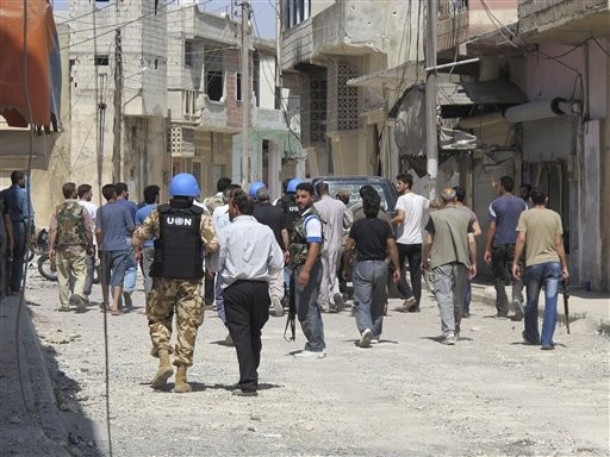
From Anne-Marie Slaughter, the New Atlanticist: Henry Kissinger recently argued against intervention in Syria [“The perils of intervention in Syria,” Sunday Opinion, June 3] on the grounds that it would imperil the foundation of world order. His analysis was based on a straw man, one put forward by the Russian and Chinese governments, that outside intervention would seek to “bring about regime change.”
The point of an intervention in Syria would be to stop the killing — to force Bashar al-Assad and his government to meet the demands of the Syrian people with reforms rather than guns. If the killing stopped, it is not clear what shape the political process would adopt, how many millions would take to the streets or whom different factions would support. The majority of Syrians would almost certainly demand that Assad leave office, but by the ballot box or a negotiated political settlement that would leave the Syrian state — in the sense of bureaucracy, the army, the courts — largely intact. The chaos and horrific violence in Iraq resulted in large part from the U.S. determination to destroy those institutions along with Saddam Hussein. . . .
Kissinger claimed that the Russian and Chinese governments are upholding the foundations of a world order that the United States should not lightly cast aside, an order in which sovereignty gives a government the right to rule its people and territory without intervention from other states and a corresponding obligation not to intervene in the affairs of others. It is true that this principle is enshrined in the United Nations Charter, but four years after the charter was passed U.N. members also adopted the Universal Declaration of Human Rights. By the end of the 20th century, U.N. Secretary General Kofi Annan — now the United Nations’ special envoy for Syria — was arguing that states existed to serve their people, rather than the other way around. And by 2005 all the world’s states, on the 60th anniversary of the U.N. Charter’s passage, adopted the doctrine of the responsibility to protect, which effectively adopted a definition of sovereignty as responsibility. Sovereigns bear responsibility to not only their fellow sovereigns but also their own people, to protect them from genocide, crimes against humanity, ethnic cleansing, and grave and systematic war crimes. . . .
President Obama believes in sovereignty as responsibility. Standing up for that principle will result in a world that will be more stable, prosperous and consistent with universal values — the values Americans know as life, liberty and the pursuit of happiness. It will be a far better world for the United States as well as for Syrians, Egyptians, Tunisians, Libyans and billions of others. But bringing it into being requires demonstrating firmly and quickly that when governments cross the line of genocide, or engage in crimes against humanity, ethnic cleansing, or grave and systematic war crimes against their own people, the world will act — with force if necessary and with the approval only of a regional organization and a majority of the members of the U.N. Security Council. Only then will murderous dictators begin to think twice.
Anne-Marie Slaughter, an Atlantic Council Board member, is Dean of the Woodrow Wilson School of Public and International Affairs and the Bert G. Kerstetter ’66 University Professor of Politics and International Affairs at Princeton University. The editorial originally appeared in the Washington Post. Photo Credit: AP Photo
Image: free%20syrian%20army.jpg
